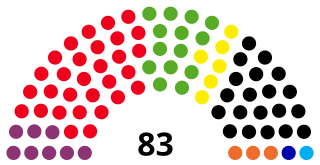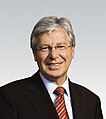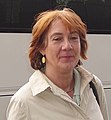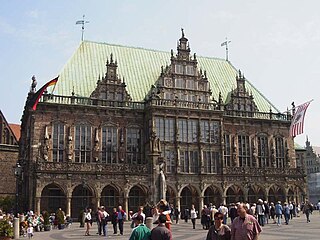The Bremen state election, 2003, was conducted on 25 May 2003 to elect members to the Bürgerschaft of Bremen.
The Bremen state election, 1999, was conducted on 6 June 1999 to elect members to the Bürgerschaft of Bremen.

Federal elections were held in Germany on 18 September 2005 to elect the members of the 16th Bundestag. This became necessary after a motion of confidence in Chancellor Gerhard Schröder failed on 1 July. Following the defeat of Schröder's Social Democratic Party (SPD) in a state election, Schröder asked his supporters to abstain from the Bundestag motion, knowing the motion would fail and thus triggering an early federal election.

Jens Böhrnsen is a German politician of the SPD. From 2005 to 2015, he has served as the President of the Senate and Mayor of the Free Hanseatic City of Bremen, that is, the head of government of the city-state Free Hanseatic City of Bremen. From 1 November 2009 until 31 October 2010 he was President of the Bundesrat and ex officio deputy to the President of Germany. Because of that he was acting head of state of Germany after the resignation of President Horst Köhler on 31 May 2010 and before the election of Christian Wulff as Köhler's successor on 30 June 2010. After voting for the SPD losses of more than five percentage points in the state election on May 10, 2015 Böhrnsen declared the next day that he would retire as head of government. His successor in the office of the Bremen government was Carsten Sieling, who was officially nominated on 18 May 2015 by the Bremen SPD.
State elections were held in the Free Hanseatic City of Bremen on 13 May 2007 to elect the Bürgerschaft.

Carl Wilhelm Kaisen was a German politician from the Social Democratic Party of Germany (SPD). Between 1945 and 1965 he was the 2nd President of the Senate and Mayor of the Free Hanseatic City of Bremen. In 1958/59 he served as the 10th President of the Bundesrat. He became a symbol of the German reconstruction in Bremen after 1945.

Federal elections were held on 22 September to elect the members of the 18th Bundestag of Germany. At stake were all 598 seats to the Bundestag, plus 33 overhang seats determined thereafter. The Christian Democratic Union/Christian Social Union (CDU/CSU) of Chancellor Angela Merkel won their best result since 1990, with nearly 42% of the vote and nearly 50% of the seats. However, their coalition partner, the Free Democrats (FDP), failed to meet the 5% vote threshold in what was their worst showing ever in a federal election, thus denying them seats in the Bundestag for the first time in their history.

The Hamburg Parliament is the unicameral legislature of the German state of Hamburg according to the constitution of Hamburg. As of 2011 there were 121 members in the parliament, representing a relatively equal amount of constituencies. The parliament is situated in the city hall Hamburg Rathaus and part of the Government of Hamburg.
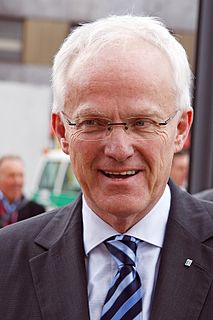
The North Rhine-Westphalia state election, 2010, was an election held on 9 May 2010, to elect members to the Landtag of the German state of North Rhine-Westphalia. The incumbent government at the election was the Christian Democrat (CDU)–FDP administration of Minister-President Jürgen Rüttgers. The biggest opposition party was the Social Democratic Party, led by Hannelore Kraft since 2005.
A Bremen state election was held on 22 May 2011, to elect the Bürgerschaft. The Christian Democratic Union's slogan was "Now do the right thing." The Social Democratic Party and the Green Party wanted to continue their coalition. Nineteen parties and political associations were authorized to participate in the election. The Citizens' Party, German People's Union and Free Voters were the parties not eligible to be in the election.

Carsten Günter Erich Sieling is a German politician of the SPD. He is currently the President of the Senate and Mayor of the Free Hanseatic City of Bremen since 15 July 2015.

The Baden-Württemberg state election 2016 was held on 13 March 2016 to elect members to Baden-Württemberg's State diet, the Landtag of Baden-Württemberg in Stuttgart. It was the 15th state election since the foundation of Baden-Württemberg in 1952. Going into the election, Winfried Kretschmann of Alliance '90/The Greens led a coalition government of his party with the Social Democrats. After the election, Kretschman was confirmed in May 2016 leading a coalition with the CDU, the first time the Greens have led such a coalition in Germany.

The Saxony-Anhalt state election was held on 13 March 2016 in Saxony-Anhalt for the 7th legislative period of the Landtag of Saxony-Anhalt. The incumbent Minister-President was Reiner Haseloff of the CDU, governing in a grand coalition with the SPD.

The 2016 Rhineland-Palatinate state election was held on 13 March 2016 to elect all 101 members to the Landtag of Rhineland-Palatinate. Seats are allotted by proportional representation with a 5% threshold. State elections were held on the same day in Baden-Württemberg and Saxony-Anhalt.

An election was held on 14 May 2017 to elect members to the Landtag of the German state of North Rhine-Westphalia.

A state election was held on 15 October 2017 to elect the 18th Landtag of Lower Saxony.
A state election was held in Hesse on 28 October 2018.
